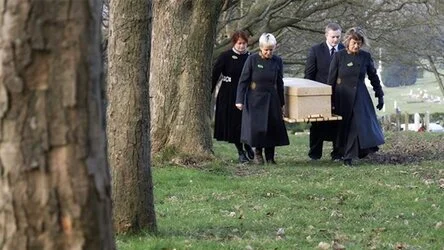Dead Good
A film which encouragingly breaks the taboo of discussing death and funerals.
Shot in and around Brighton, Rehana Rose's documentary is a very sympathetic film. It is centred on Cara Jane Mair, and to a lesser extent on Sarah Clarke-Kent, both of whom are in business as funeral directors. In seeking to make a film useful to the bereaved, Rehana Rose actually contacted ten such practitioners but these were the only two willing to be filmed. The loss of the others is not to be regretted since both women come over well whether discussing their career choice or being observed with clients. It is probably not by chance that both of these women featured have a modern outlook on their work: they seek to involve the relatives of a deceased as much as possible and react strongly against attitudes that once prevailed when funeral directors were likely to be dictatorial about what was suitably respectable for a funeral service and what was beyond the pale even if specifically requested.
Dead Good is a title that could have applied to a black comedy but, if one questions that choice, the film itself in its own simple, unpretentious way fulfils a worthwhile function. Given that death can be a taboo subject and that it can only be beneficial for people to have greater knowledge of funeral procedures and of the various kinds of service available these days, the film is welcome. It intercuts material relating to three deaths and in each case we meet the immediate family and learn a little about the lives that have ended (Richard was a gay man who died in sad circumstances but is mourned by his sister and his ex-partner; Victoria, an elderly victim of cancer, is warmly remembered by her two daughters both on a personal level and for her theatre work; Colin has died in a hospice but Louise, his former partner, ensures that his funeral reflects his love of the countryside).
At the close we are told that the progressive death movement is growing in a number of countries, but the film sidesteps any wider picture to concentrate on the outlook of Cara and Sarah and of a Sussex priest, Peter Owen-Jones. By taking these three examples of bereavement, the film is able to cover a range of matters: for example, Cara states the case against embalming and encourages Victoria's daughters to participate in the laying out of the body, a gesture which they appreciate. Cara adds that in some parts of the country her attitudes might lead to her being seen as a freak - but not in Brighton! Rehana Rose gives us a film in which everyone comes across engagingly and its popular tone is reflected in the fact that it both begins and ends with song on the soundtrack (Robert Smith sings 'Pictures of You' over the closing credits and Alison Moyet is the unusual choice to give us the famous lament from Purcell's Dido and Aeneas at the start). The film ends with three funerals in a row but because it is a kindly, helpful work, it does not feel downbeat.
MANSEL STIMPSON
Featuring Sarah Clarke-Kent, Cara Jane Mair, Peter Owen-Jones, Gill Bendelow, Hannah Thompson, Sarah Thompson, Louise Holloway, Paul Tyrrell.
Dir Rehana Rose, Pro Rehana Rose, Ph Rehana Rose and Lisa Thomson, Ed Alan Mackay, Music Deborah Mollison.
Ponder Productions-Miracle/Ponder.
78 mins. UK 2018. Rel: 10 May 2019. Cert. PG.


